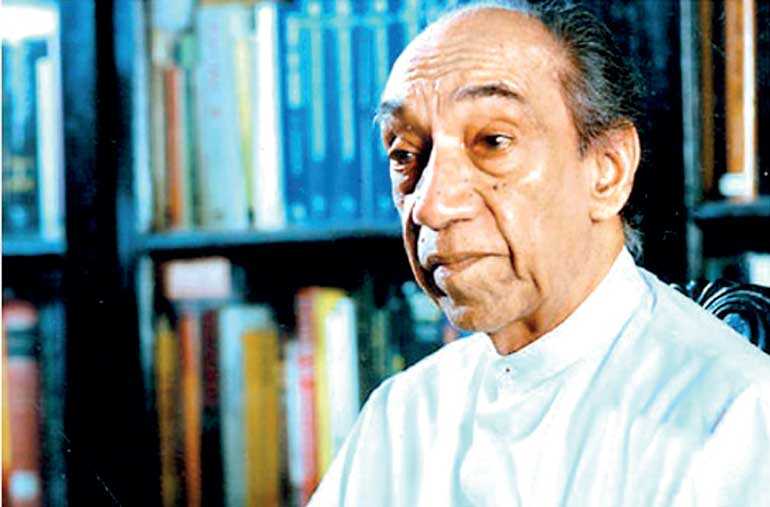Friday Feb 20, 2026
Friday Feb 20, 2026
Thursday, 6 February 2020 00:00 - - {{hitsCtrl.values.hits}}

Our concern today regards the National Intelligence Act which makes us go back to a fateful day in February 1978 when then-Prime Minister Junius Richard Jayewardene became President following constitutional changes that effected the creation of the Executive Presidency. For over 40 years Sri Lanka has endured a period in which the separation of powers came to an end and the Legislature, Executive and Judiciary fell into the hands of a single person: the President
National intelligence agencies in a country cannot operate in a vacuum. They must have guidance from the people they serve. They exist as tools of government to gather and assess information, and if they do not receive direction, the chances are greater that resources will be misdirected and wasted. They need to know what information to collect, when it is needed and how to best assemble it so as to create some cohesion. Guidance must come from the top.
Our concern today regards the National Intelligence Act which makes us go back to a fateful day in February 1978 when then-Prime Minister Junius Richard Jayewardene became President following constitutional changes that effected the creation of the Executive Presidency. For over 40 years Sri Lanka has endured a period in which the separation of powers came to an end and the Legislature, Executive and Judiciary fell into the hands of a single person: the President.
We witnessed a Parliament which completely relinquished its capacity to control the Executive and hold it to account. The country is still being governed by presidential decrees. We have observed and experienced how the many members of the judicial system, the High Council of Judges, prosecutors and those of the highest courts, have been named by a single person; and live in a situation where if the President proclaims a State of Emergency, he will also be able to issue legally binding decrees and control the country without the Parliament having any say in the matter whatsoever. 
Compromised legislators
Our fear is that when the Cabinet approved the drafting of the ‘National Intelligence Act’ Bill, legislators and some partisans who strongly supported their party's policies were reluctant to compromise with their political opponents. They proclaimed that the Bill was clearly unconstitutional and illegal but at the same time it offers a free pass to party members, supporters and security personnel who break the law, and creates even more uncertainty in the process. Most importantly, it punishes anyone who dares to point out that the emperor has no clothes. This will turn out to be truly embarrassing.
So, in the near future we may have a repeat of the functioning of the Executive Presidency in the guise of the National Intelligence Act. It is very hard for the people to even imagine how this would be legal, when it is an effort to ensure that political incumbents and powerful special interests can avoid any type of accountability because they will be able to intimidate and threaten any citizen who dares to question them.
We can also expect political insiders prioritising efforts to protect themselves from being exposed, those who have committed and may commit some of the most egregious violations; conspicuously flagrant and outrageously reprehensible iniquities. At the same time, weaponising the Judiciary and making it a partisan tool only to attack political enemies and being gamed in an unfair and unscrupulous manner to protect their political friends, while every attempt is made to punish all who dare to even look at them.
We can also visualise the maximising of the complexity of enforcement action providing ample ability for political insiders to escape punishment and penalties for violating the law, while they create a Byzantine system of punishment for newcomers to the political process where politicians can wholesale violate the law. Obviously these will have even more ‘unintended’ and severe consequences.
This Act will also make elections hollowed out as autocracies, a political theory favouring unlimited authority by a single individual, and find ways to control their results while sustaining a veneer of competitive balloting. Polls in which the outcome can be shaped by coercion, fraud, gerrymandering, dividing voting districts unfairly and to one's advantage, or other manipulations
In such a situation, it will turn out largely to be the punishment of the innocent and the guilty by the guilty. All kinds of petty rats, certain police officials, penny-a-lining journalists and women will be hunted down while almost without exception the big rats will escape and we, the rest of us, the little people, ordinary, innocent citizens who even commit a minor violation, will just be crushed. Sri Lanka will end up being horribly ashamed.
This Act will also make elections hollowed out as autocracies, a political theory favouring unlimited authority by a single individual, and find ways to control their results while sustaining a veneer of competitive balloting. Polls in which the outcome can be shaped by coercion, fraud, gerrymandering, dividing voting districts unfairly and to one's advantage, or other manipulations. Freedom of expression will come under sustained attack, through both assaults on the press and encroachments on the speech rights of ordinary citizens. The offensive against freedom of expression will be supercharged by a new and more effective form of digital authoritarianism.
We who are committed to human rights and democratic governance should not limit ourselves to a wary defence of the status quo. Instead, we should throw ourselves into projects intended to renew national and international participation, to make protections of human dignity even more just and more comprehensive, including for workers whose lives are disrupted by technological and economic change.
Protection of democratic norms
Our beloved country, the Democratic Socialist Republic of Sri Lanka, requires continuous effort to thrive, and a constant willingness to broaden and deepen the application of its legislation and principles. The future of democracy depends on our ability to show that it is more than a set of bare-minimum defences against the worst abuses of tyrants, it is a guarantee of the freedom to choose and live out one’s own destiny. We must demonstrate that the full promise of democracy can be realised, and recognise that no one else will do it for us. We should oppose the continual undermining of institutions that protect the freedoms of expression and association and the rule of law.
We can see that our politics is straining our core values and testing the stability of our constitutional system. In our living memory nothing shows less respect for its tenets, norms and principles than this present era. Some of our politicians have assailed and aggressively challenged and abused the essential institutions - the free press, independent Judiciary, the impartial delivery of justice and safeguards against corruption. It is sad to note that successive governments also frequently failed to meaningfully push back against these attacks.
We recognise the right of freely-elected presidents and lawmakers and pursue other legitimate aims related to national security. But they must do so according to the rules designed to protect individual rights and ensure the long-term survival of the democratic system.
There are no ends that justify non-democratic means.
The goal should not be to protect incumbents and the powerful special interests that control the bureaucrats but new laws that are to be enacted should make the process fair for everyone, not tilted in favour of one political party over another or tilted in favour of one special interest over another.
This is what every right-minded, right-thinking citizen wants.
“Man is neither angel nor brute, and the unfortunate thing is that he who would act the angel, acts the brute” – Blaise Pascal.